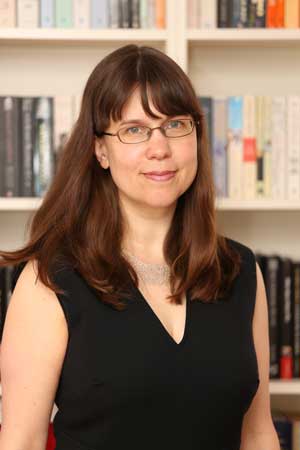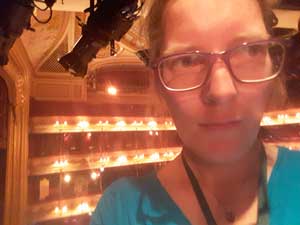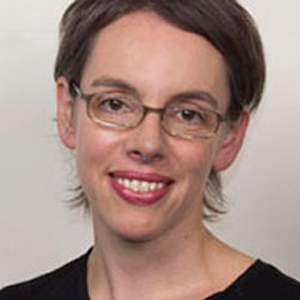
Professor Alexandra Wilson
Follow Alexandra on Twitter: @amwilson_opera
Alexandra Wilson (Co-Founder and Co-Director of OBERTO, with Barbara Eichner) is Professor of Music and Cultural History at Oxford Brookes University.
Alexandra is a musicologist and cultural historian specialising in late nineteenth- and twentieth-century opera viewed within its critical, cultural and political contexts. A particular focus of her research has been the reception and politicisation of Puccini’s works: her monograph, The Puccini Problem: Opera, Nationalism, and Modernity (Cambridge University Press, 2007) was awarded the American Musicological Society’s Lewis Lockwood Award for a work of outstanding musicological scholarship.
Alexandra’s new book, Opera in the Jazz Age: Cultural Politics in 1920s Britain, will be published by Oxford University Press in 2019, and considers the complex place of opera in the 1920s ‘battle of the brows’. She is also completing a book for OUP about Puccini’s La bohème, aimed at general readers. Alexandra has been awarded a Leverhulme Major Research Fellowship for the academic years 2018-2021 in order to work on a new, large-scale project tracing the historical roots of current stereotypes about opera and elitism.
In addition to her academic work, Alexandra undertakes much high-profile public engagement and media work. She can be heard regularly on BBC Radio 3 and has written programme essays, given talks and recorded podcasts or interviews for the leading UK opera companies. Radio 4’s PM programme recently called her ‘a real ambassador for opera’. Her book, Opera: A Beginner’s Guide (Oneworld, 2010), seeks to demystify opera and demonstrate its relevance to contemporary life.

Dr Barbara Eichner
Follow Barbara on Twitter: @BarbaraEichner
Barbara Eichner (Co-Founder and Co-Director) is a music historian who counts, among her many and varied interests, the stage works of Richard Wagner and Richard Strauss in their historical, cultural and aesthetic contexts. Several chapters of her monograph History in Mighty Sounds: Musical Constructions of German National Identity, 1848-1914 (Boydell, 2012) investigate the role of opera in the formation of a German national identity in the second half of the ‘long’ nineteenth century. She is particularly interested in works that are rooted in national myth and history (e.g. the Nibelungs or ‘Hermann the German’), and the question of transnational and cross-cultural transfer and reception. She wrote the entries on ‘German national identity’ and Lohengrin for the Cambridge Wagner Encyclopedia edited by Nicholas Vazsonyi, and contributed a chapter on ‘Richard Wagner’s Medieval Visions’ for The Oxford Handbook of Music and Medievalism as well as a chapter about the reception of the Ring to the Cambridge Companion to Wagner’s Ring. Sometimes she even brings together her main research interests – nineteenth-century opera and early-modern monastic music –, like in this open-access contribution to the book Performing Music History.
Barbara regularly participates in broadcasts from the Royal Opera House for BBC Opera on 3, most recently Tannhäuser, Die Meistersinger von Nürnberg and Lohengrin. She has contributed to online opera guides such as Wagner: Making a National Hero and writes programme notes for the orchestras and choruses of the Bavarian Radio. Barbara also regularly speaks at outreach events, such as the ‘Insight’ events of Garsington Opera (on Verdi’s Falstaff) and the Royal Opera House (on Wagner’s Ring), and gives pre-concert talks, e.g. for the BBC Proms Extra series in 2016 and 2019.

Dr Alessandra Palidda
Dr Alessandra Palidda joined the Brookes Music team in September 2018 for three years while Professor Alexandra Wilson is on research leave supported by the Leverhulme Trust. Alessandra studied Singing at the Conservatoire of Milan and Musicology up to MA level at the University of Milan, before being offered a PhD Historical Musicology at Cardiff University. She has completed her doctoral degree there under the supervision of Prof David Wyn Jones and Dr Clair Rowden, investigating the relationship between socio-political change and the musical environment in Habsburg and Napoleonic Milan. Alessandra specializes in opera studies, with a particular focus on the history of Italian opera of the 18th and 19th centuries, opera and politics and opera and propaganda, and has widely disseminated her research through conferences and publications, both in English and Italian. Her most recent publications include contributions to the volumes Music and War in Europe from the French Revolution to WWI and Music and Power in the Baroque Era, both edited by Brepols in the Music, Criticism & Politics series and book reviews for the Rivista Italiana di Musicologia and for H-France. During and after her doctoral degree, Alessandra has also taught modules in History of Opera and Musical Dramaturgy, and has also worked as an Italian tutor (Cardiff University, School of Modern languages) and as vocal coach for singers. She is also a committed singer and recorder player.

Dr Andrew Holden
Andrew Holden is a Visiting Researcher at Oxford Brookes. Andrew is a musicologist and cultural historian working in both historical and contemporary contexts. In 2019 he was awarded a doctorate from Oxford Brookes for a thesis entitled ‘Opera avanti a Dio! Opera and religion in Liberal Italy from Unification to the First World War’. His areas of research focus on transnational themes of operatic production, circulation and reception, and the continued importance of censorship, for example in Italy, long after it has generally been assumed to have been abolished. This interest in censorship Andrew applies also to study of the contemporary opera industry and how the circulation of opera productions encounters censorship in many varied forms.
He recently published ‘A slice of operatic life in London’s East End’, Journal of Modern Italian Studies 26/1 ‘Italian Musical Migration to London’ (special issue) which he co-edited. Forthcoming publications include ‘From Heaven and Hell to the Grail Hall via Sant’Andrea della Valle: religious identity and the internationalisation of operatic styles in Liberal Italy’ in Körner and Kühls (eds.), Reimagining Italianità: Italian Opera in transnational perspective (Cambridge: Cambridge University Press, 2021 in press), and is co-editing a new volume on censorship in the contemporary opera industry.
Andrew has returned to academia after fifteen years working in arts and heritage management, and is still a consultant and Associate Director of Activist Group. Previously he studied history at Queen Mary University of London with Peter Hennessy and published Makers and Manners: politics and morality in post-war Britain (Politico’s) in 2004. Andrew is now based in Turin, living coincidentally in a street where Puccini stayed during rehearsals for Le Villi in 1884 (see photo above).

Dr Katharine Craik
Follow Katharine on Twitter: @kcraik1
Dr Katharine Craik is a Reader in Early Modern Literature (1550-1700) in the Department of English and Modern Languages at Oxford Brookes, and a librettist. Her current opera project, Watching, a collaboration with composer Dee Isaacs (University of Edinburgh), is an exploration of the history of sleep funded by an Arts Award from the Wellcome Trust. Previous works include The Quicken Tree (2011), also with Dee Isaacs; and works for Glyndebourne Education and ENO Baylis written in collaboration with composer David Knotts.
